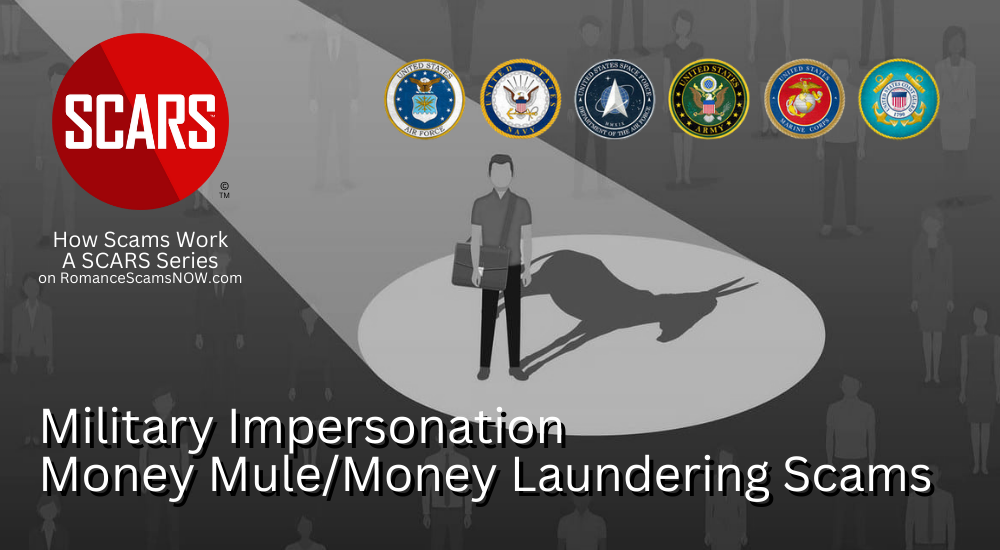SCARS™ Commentary: The Odds Of Being Scammed Again
Here Is An Exercise In Understanding How Intuition (Or Your Gut) Is More Likely Wrong Than Right
WATCH THIS VIDEO AND THEN READ THE REST OF THIS ARTICLE
Was Your Intuition Right?
The simple act of relying on your gut is by definition wrong. That is why knowledge and behaviors are a better approach to your safety than your intuition.
Dealing with complexity is both something we are good at (when linear) and impossible for us at the same time.
A Perfect Example Of This Right Now Is The Perception Of Risk In A Pandemic
It is very simple, the risk is very high you will get the virus, but when people try to figure it out they will come to the wrong conclusion.
While the odds may be reasonable – it applies to each and every interaction, not over a span of time.
Let’s say that you have a 30% risk of getting infected. That is 30% for each and every event or interaction. So if about one in three is the risk, and you have 10,000 interactions, then 3,000 of them will result in an infection – a virtual certainty.
This Is EXACTLY Like The Problem Of Assessing The Risk Of Being Scammed Online
People’s guts say it will never happen, but in fact, it is a virtual certainty.
In addition, it is a virtual certainty that you will be scammed again unless you remove yourself from the risk pool.
The only way to do that is by adopting behaviors that prevent the initiation of new scams.
BUT YOU ONLY HAVE TO DROP YOUR GUARD ONE TIME AND THE ODDS ARE HIGH YOU CAN BE SCAMMED AGAIN.
So If The Average Is That Victims Are Scammed 2.4X (2.4 Times)
This means the odds are that you will be scammed more than once
In fact, our analytics shows that the probability of someone being scammed is nearly 99.9999999999999% Though it is actually only about 8% for any given incident. But since there are (estimated) 26 TRILLION (yes with a “T”) cyberattack incidents a year (source McAfee), 8% of that is a little over 2 Trillion attacks that will succeed.
But that is actually not correct, because it is not 8% total that will succeed, but 8% of each of the 26 Trillion incidents. Meaning, a virtual certainty.
For Example: Think About Your Antivirus Software
You cannot accurately calculate the odds of your antivirus (AV) product protecting you because probabilities deal with the odds of specific events happening. Here, the cyberattack could be spam, malware, phishing, social engineering, or some other form of attack. Within each of those categories, there is a wide range of types of attacks. On average, there are 26 trillion malicious attacks per year, so there are going to be a lot of attack vectors crashing into your AV product. Calculating the odds is almost impossible. It’s Downright Scary!
What we do know is that for those 26,000,086,000,000 or whatever higher, scarier number it is, the AntiMalware product did not stop whatever malicious threats and allowed the breaches we read about all the time. Of course, none of the other defenses those companies had in place stopped the criminals. In fact, 100% of the time, the combination of all of these products failed for these victim companies – because they had to stop 100% of the attacks, but they only have to fail ONE TIME.
What can you do?
It is apparent from these numbers and from the daily news reports, that there are at least two major things happening in the cyber world:
- the good guys are losing, and
- the bad guys are winning!
This is not just both sides of the same coin, there is much more to it than that.
Sure, the bad guys are getting better at what they do. They have entire infrastructures to rely on, social networks for criminals, division of labor, secondary markets for their tools, and they learn quickly from what they learn.
They are not all smart, but many are and there are MANY of them.
You are JUST you. You only have to make ONE mistake, which you did before and you see where you are now.
So, Why Are The Good Guys Losing?
There are lots of reasons to be sure, but a significant number of attacks are successful because the incoming threat was not detected at all or not detected until it was too late. Does that sound like what happened to you?
The collective description of the problem in these cases is that people are trying to fight today’s cyberwar (and it is a war) using yesterday’s tactics and yesterday’s weapons. Or worse, they are listening to amateurs and incompetent sources.
Many Victims Are Surprised To Learn That There Is A Better Way
That better way is to use actionable intelligence and proactive intervention to identify the sources of the malicious threats, identify the bad actors and their tools and networks, and to use this information to prevent their success and to take down their infrastructure.
That sounds a lot like what SCARS does. But most of you do not participate in that, so we are few and they are MANY!
This is why we hammer on you over behavioral changes and knowledge to recognize risks.
On this website, about 10% of our visitors have the focus needed to prevent most scams. About 90% are likely to be scammed again and again and again and again.
That thought is incredibly depressing.
But You Control The Equation
Remove yourself from the risk pool through knowledge, change, and reinforcement (another word for that is “participation”).
- Knowledge acquired passively is not retained.
- Knowledge that goes unreinforced is not retained.
- Knowledge that is not integrated in the form of behavioral change is not retained.
There You Have The Reality Of What Is Likely To Happen In The Future
You can agree or disagree. The numbers may be different, but it does not matter, because even if they are off by 25% these facts are still a certainty.
- 10% of our visitors try.
- 90% of our visitors do not try.
How do YOU calculate your odds of being safe online in the future now?
TAGS: SCARS, Important Article, Information About Scams, Anti-Scam, Scams, Scammers, Fraudsters, Cybercrime, Crybercriminals, Romance Scams, Scam Victims, Odds of Being Scammed, Repeat Scams, Staying Safe Online, Cyberattacks, Anti-Malware
SCARS™ Team
Society of Citizens Against Relationship Scams Inc.
A Worldwide Crime Victims Assistance Nonprofit Organization
Visit: www.AgainstScams.org
Contact Us: Contact@AgainstScams.org
PLEASE SHARE OUR ARTICLES WITH YOUR FRIENDS & FAMILY
HELP OTHERS STAY SAFE ONLINE – YOUR KNOWLEDGE CAN MAKE THE DIFFERENCE!
The Latest SCARS Posts:
FIND MORE SCAM NEWS
«SCAMCRIME.COM»
JOIN US ON FACEBOOK
«CLICK HERE»
END
MORE INFORMATION
– – –
Tell us about your experiences with Romance Scammers in our
« Scams Discussion Forum on Facebook »
– – –
FAQ: How Do You Properly Report Scammers?
It is essential that law enforcement knows about scams & scammers, even though there is nothing (in most cases) that they can do.
Always report scams involving money lost or where you received money to:
- Local Police – ask them to take an “informational” police report – say you need it for your insurance
- U.S. State Police (if you live in the U.S.) – they will take the matter more seriously and provide you with more help than local police
- Your National Police or FBI « www.IC3.gov »
- The SCARS|CDN™ Cybercriminal Data Network – Worldwide Reporting Network on « www.Anyscam.com »
This helps your government understand the problem, and allows law enforcement to add scammers on watch lists worldwide.
– – –
To learn more about SCARS visit « www.AgainstScams.org »
Please be sure to report all scammers
on « www.Anyscam.com »
Disclaimer:
SCARS IS A DIGITAL PUBLISHER AND DOES NOT OFFER HEALTH OR MEDICAL ADVICE, LEGAL ADVICE, FINANCIAL ADVICE, OR SERVICES THAT SCARS IS NOT LICENSED OR REGISTERED TO PERFORM.
IF YOU’RE FACING A MEDICAL EMERGENCY, CALL YOUR LOCAL EMERGENCY SERVICES IMMEDIATELY, OR VISIT THE NEAREST EMERGENCY ROOM OR URGENT CARE CENTER. YOU SHOULD CONSULT YOUR HEALTHCARE PROVIDER BEFORE FOLLOWING ANY MEDICALLY RELATED INFORMATION PRESENTED ON OUR PAGES.
ALWAYS CONSULT A LICENSED ATTORNEY FOR ANY ADVICE REGARDING LEGAL MATTERS.
A LICENSED FINANCIAL OR TAX PROFESSIONAL SHOULD BE CONSULTED BEFORE ACTING ON ANY INFORMATION RELATING TO YOUR PERSONAL FINANCES OR TAX RELATED ISSUES AND INFORMATION.
This content and other material contained on the website, apps, newsletter, and products (“Content”), is general in nature and for informational purposes only and does not constitute medical, legal, or financial advice; the Content is not intended to be a substitute for licensed or regulated professional advice. Always consult your doctor or other qualified healthcare provider, lawyer, financial, or tax professional with any questions you may have regarding the educational information contained herein. SCARS makes no guarantees about the efficacy of information described on or in SCARS’ Content. The information contained is subject to change and is not intended to cover all possible situations or effects. SCARS does not recommend or endorse any specific professional or care provider, product, service, or other information that may be mentioned in SCARS’ websites, apps, and Content unless explicitly identified as such.
The disclaimers herein are provided on this page for ease of reference. These disclaimers supplement and are a part of SCARS’ website’s Terms of Use.
Legal Notices:
All original content is Copyright © 1991 – 2020 Society of Citizens Against Relationship Scams Inc. (D.B.A SCARS) All Rights Reserved Worldwide & Webwide. Third-party copyrights acknowledge.
SCARS, SCARS|INTERNATIONAL, SCARS, SCARS|SUPPORT, SCARS, RSN, Romance Scams Now, SCARS|INTERNATION, SCARS|WORLDWIDE, SCARS|GLOBAL, SCARS, Society of Citizens Against Relationship Scams, Society of Citizens Against Romance Scams, SCARS|ANYSCAM, Project Anyscam, Anyscam, SCARS|GOFCH, GOFCH, SCARS|CHINA, SCARS|CDN, SCARS|UK, SCARS|LATINOAMERICA, SCARS|MEMBER, SCARS|VOLUNTEER, SCARS Cybercriminal Data Network, Cobalt Alert, Scam Victims Support Group, are all trademarks of Society of Citizens Against Relationship Scams Inc., All Rights Reserved Worldwide
Contact the law firm for the Society of Citizens Against Relationship Scams Incorporated by email at legal@AgainstScams.org











Please Leave A Comment - Tell Us What You Think About This!